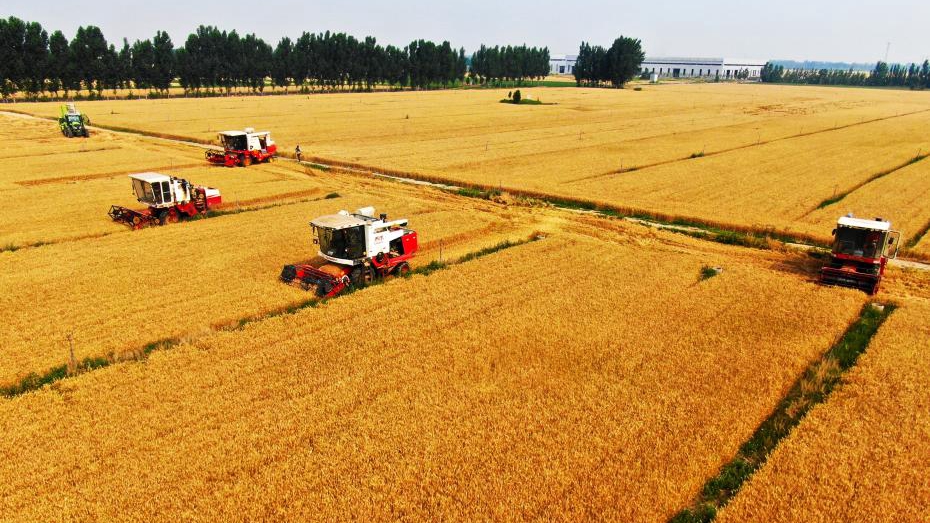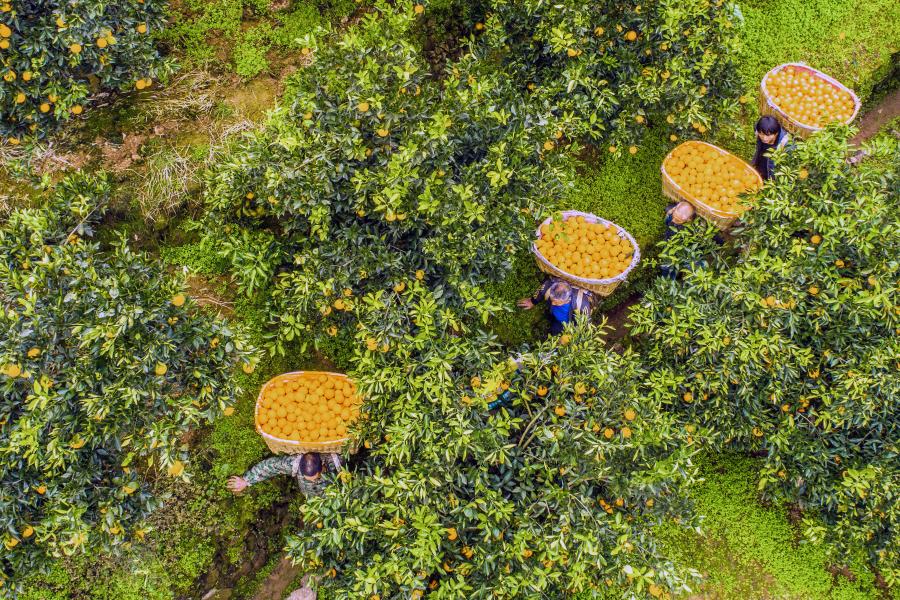
Harvesting wheat in Dafu Village, Xixindian Township, Botou City, north China's Hebei Province, June 12, 2020. /Xinhua
Harvesting wheat in Dafu Village, Xixindian Township, Botou City, north China's Hebei Province, June 12, 2020. /Xinhua
Editor's note: Li Guoxiang is a research fellow at the Rural Development Institute under the Chinese Academy of Social Sciences. The article reflects the author's views, and not necessarily those of CGTN.
Chinese President Xi Jinping recently delivered an important speech at the Central Rural Work Conference, calling for a shift of focus to comprehensively promote rural revitalization, clearly prioritizing the allocation of public resources to accelerate agricultural and rural development, and mobilizing the entire society to continue to participate in and support China's work concerning agriculture, rural areas and farmers as in the case of poverty alleviation, so as to accelerate the agricultural and rural modernization.
The shift of focus from poverty alleviation to comprehensive rural revitalization is mainly driven by the historical mission of the Communist Party of China (CPC). After setting the goal of leading the whole nation to build a moderately prosperous society in all respects, the Chinese government organized and mobilized all stakeholders to fight poverty and ultimately eliminated absolute poverty. On top of that, it hopes to lead the whole nation to build a modernized country in an all-round way.
One of the important components of the country's modernization drive is to modernize agriculture and rural areas. However, progress in this area is lagging behind that of industrialization and urbanization. The modernization of agriculture and rural areas must be oriented to revitalizing the countryside and accelerating the pace of rural development.
The shift of focus to the comprehensive promotion of rural revitalization is also driven by the current domestic and international situation. To speed up the formation of a new development pattern of "dual circulation" in which domestic and foreign markets reinforce each other, with the domestic market as the mainstay, it's imperative for agriculture, rural areas and farmers to play a stabilizing and supportive role in maintaining China's economic and social development.
How to promote rural revitalization comprehensively? First of all, geographically speaking, the historical shift of focus in the work concerning agriculture, rural areas and farmers to the comprehensive promotion of rural revitalization points to a new mission for regions which just walked out of poverty.

An orange plantation in Leigutai Village, Guojiaba Township, Zigui County, central China's Hubei Province, December 4, 2020. /Xinhua
An orange plantation in Leigutai Village, Guojiaba Township, Zigui County, central China's Hubei Province, December 4, 2020. /Xinhua
How to promote rural revitalization in regions just lifted out of poverty? Generally speaking, there is no essential difference in works to be done in promoting rural revitalization between these regions and other regions of the country, but they have to do additional work which is to carry out non-stop monitoring of the vulnerable population who just walked out of poverty, keep the existing policies in place, and ensure that public resources for poverty alleviation are increased rather than reduced.
Meanwhile, new and more effective assistance measures should be implemented to make the accomplishment of poverty alleviation more lasting, so that the successful experience and practices of poverty alleviation can be referred to in China's rural revitalization campaign.
Secondly, to comprehensively promote rural revitalization, the most important task is to strengthen food security and maintain adequate supply of agricultural products.
To this end, it is necessary to protect arable land by holding the bottom line of a minimum 120 million hectares land for food production; build high-standard farmland, preserve the black soil area and ensure that the fertility of arable land does not decline; step up agricultural science and technology innovation and overcome the technical bottlenecks that impede China's modern agricultural development; ramp up subsidies for grain farmers, improve the minimum purchase price policy and expand the coverage of policy insurance to incentivize farmers to grow grain.
In addition, China also needs to build stronger rural industries and increase farmers' income through various benefit-sharing schemes; set up more education programs on civility and morality in rural areas, popularize scientific knowledge to build a more positive rural lifestyle; control pollution caused by the abusive use of chemical fertilizers and pesticides, crop straw burning, random dumping of livestock and poultry feces to build a better rural ecological environment; strengthen the construction of rural infrastructures to improve the living environment in rural areas; and take counties as an important lever in pushing for urban-rural integrated development by tapping into the extensive service capacity of counties.
These are the key points in China's work concerning agriculture, rural areas and farmers in 2021.
The Central Rural Work Conference at the end of each year usually sets in motion the work concerning agriculture, rural areas and farmers in the upcoming year. The speech of President Xi Jinping at the conference further emphasized the policy direction of accelerating the modernization of agriculture and rural areas, clearly pointed out the main tasks concerning agriculture, rural areas and farmers in 2021 and beyond, and provided a plan to work on the key building blocks of rural revitalization comprehensively.
The speech will galvanize the enthusiasm of the vast number of people working on issues related to agriculture, rural areas and farmers, help mobilize more resources to support rural revitalization programs and inspire practical efforts that truly deliver progress and live up to the historical mission of the CPC.
(If you want to contribute and have specific expertise, please contact us at opinions@cgtn.com.)

